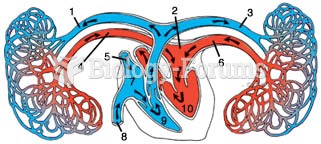Answer to Question 1
4
Rationale 1: Severe impairment or complete loss of blood flow causes myocardial infarction and a high risk of sudden death.
Rationale 2: Moderate restriction of blood flow to the coronary arteries leads to angina.
Rationale 3: Cerebrovascular accident is a stroke, and does not occur in the heart.
Rationale 4: Coronary heart disease (CHD), also called coronary artery disease (CAD), is the term used to describe impaired blood flow in the coronary arteries. Moderate restriction of flow leads to angina pectoris. Severe impairment or complete loss of blood flow causes myocardial infarction and a high risk of sudden death. CHD can also cause dysrhythmias and lead to heart failure.
Global Rationale: Coronary heart disease (CHD), also called coronary artery disease (CAD), is the term used to describe impaired blood flow in the coronary arteries. Moderate restriction of flow leads to angina pectoris. Severe impairment or complete loss of blood flow causes myocardial infarction and a high risk of sudden death. CHD can also cause dysrhythmias and lead to heart failure. Cerebrovascular accident is a stroke, and does not occur in the heart.
Answer to Question 2
3
Rationale 1:Blood pressure is not one of the focuses of primary characteristics of heart failure.
Rationale 2:The ability of the heart rate to speed up or slowdown is the second characteristic important to pharmacology.
Rationale 3: Contractility or the strength of contraction is the most important characteristic of heart failure. The fundamental cause of heart failure is a weak myocardium, causing the muscle to beat more forcefully is the ideal solution.
Rationale 4:Impulse conduction speed is the third fundamental characteristic of cardiac physiology.
Global Rationale: The ability to change the force of contraction, or contractility is of particular interest in the pharmacotherapy of heart failure. Because the fundamental cause of heart failure is a weak myocardium, causing the muscle to beat more forcefully is the ideal solution. The ability to increase the strength of contraction is called a positive inotropic effect.







